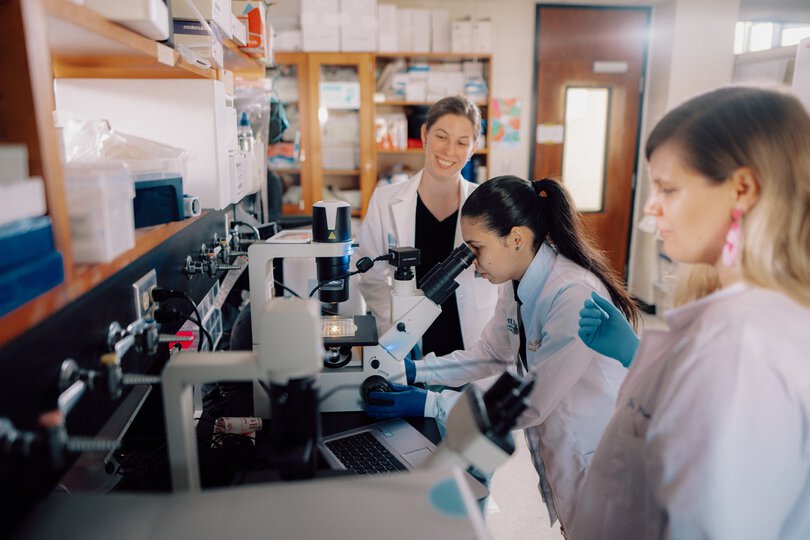Cardiac Signaling Center
A statewide collaboration advancing cardiac biology, stem cell engineering, and electrophysiology to develop next-generation therapies and biological pacemakers for heart disease.

At the Medical University of South Carolina, the Department of Regenerative Medicine & Cell Biology leads transformative research that bridges molecular biology, developmental science, and translational medicine. Faculty, trainees, and collaborators explore how cells and tissues grow, regenerate, and respond to disease, unlocking discoveries that shape the future of precision medicine.
Our research spans cardiovascular development, gastrointestinal health, molecular signaling, and bioengineered tissue systems, fostering collaboration among scientists, clinicians, and engineers to improve human health.
Our research centers unite scientists, clinicians, and educators to advance discovery, collaboration, and training in regenerative science and translational medicine.
A statewide collaboration advancing cardiac biology, stem cell engineering, and electrophysiology to develop next-generation therapies and biological pacemakers for heart disease.
Dedicated to excellence in teaching and research, this center provides modern facilities and anatomical programs that advance education, training, and outreach across MUSC’s academic and clinical colleges.
Advancing innovative research in inflammation, metabolism, and cancer, this center unites experts to uncover molecular mechanisms and novel treatments for digestive and liver diseases.
Building on the strength of our research centers, our laboratories drive the next generation of scientific discovery. Each lab explores critical questions to improve understanding of human health and disease. Together, these investigations form the foundation for breakthrough therapies that transform patient care and expand the boundaries of biomedical innovation.
The Barth Lab investigates how gene expression programs influence cell lineage and regeneration. Projects include understanding elastin synthesis for tissue repair and exploring auditory nerve regeneration to restore hearing.
The Duncan Lab uses mouse models and induced pluripotent stem cells to study liver development and metabolic disease. Their work informs therapies for rare hepatic disorders and the creation of functional hepatocytes for transplantation.
The Amy Engevik Lab explores how the molecular motor Myosin Vb regulates epithelial polarity and intestinal function. Their research connects Myosin Vb dysfunction to congenital diarrhea, liver cholestasis, and gastrointestinal cancers.
The Mindy Engevik Lab studies how gut microbes communicate with intestinal mucus layers to support health or drive disease. Their work identifies microbe-mucus dynamics that promote healing and influence Clostridium difficile infection.
The Guglietta Lab examines how intestinal immune responses and microbiota interactions contribute to colorectal cancer, inflammatory bowel disease, and neurodegeneration, revealing systemic effects of gut inflammation.
The Hammad Lab explores sphingolipid metabolism in autoimmune and metabolic disorders. Their discoveries advance biomarker identification and therapeutic targets for atherosclerosis, diabetes, and PTSD-related vascular complications.
The Christi Kern Lab studies proteoglycan turnover and ADAMTS protease function in cardiovascular and joint development. The lab’s work advances regenerative medicine through insights into molecular mechanisms and tissue biomechanics.
The Michael Kern Lab investigates homeobox genes that govern tissue morphogenesis and biomechanics, including craniofacial and joint development, while integrating bioengineering and genetic modeling approaches.
The Kourtidis Lab studies the connection between cell-cell adhesion and RNA biology, uncovering how junctional RNA complexes regulate cell homeostasis and tumor suppression to prevent disease transformation.
The Markwald Lab pioneers cardiac developmental biology and bioprinting research to engineer living tissue models. Their work drives innovations in heart valve regeneration and congenital heart disease therapies.
The Morad Lab investigates calcium signaling and cardiac electrophysiology to uncover mechanisms behind heart failure. Their discoveries support developing biological pacemakers that could replace electronic devices.
The Muise-Helmericks Lab studies how Akt kinases regulate angiogenesis, mitochondrial function, and tissue regeneration. Their work bridges molecular pathways of vascular growth and wound healing using advanced nanofiber technologies.
The Múnera Lab generates human colonic organoids to study congenital and inflammatory diseases. These 3D models integrate immune and epithelial systems to reveal cross-signaling mechanisms underlying gut health.
The Norris Lab investigates genetic mechanisms behind connective tissue diseases such as Ehlers-Danlos syndrome and valve disorders. Their multidisciplinary research develops personalized treatments and novel therapeutic pathways.
The Sucov Lab explores cardiomyocyte proliferation and heart regeneration mechanisms to combat heart failure. Their groundbreaking genetic studies redefine how adult heart cells recover after injury.
The Tao Lab connects developmental pathways to adult heart regeneration. Their research uncovers molecular signaling systems, including Pitx2 and Nrf2, to guide novel therapies for myocardial injury and heart failure.
The Wessels Lab investigates the mechanisms of congenital heart disease and valve development. Through advanced models, the team reveals how molecular and cellular processes contribute to normal and abnormal cardiac formation.
The Yamaguchi Lab studies how calcium ion regulation drives cardiac and skeletal muscle function. Their research identifies how mutations in calcium channels lead to heart failure and skeletal myopathies.
Learn how our department’s groundbreaking work continues to expand possibilities for regenerative medicine.


